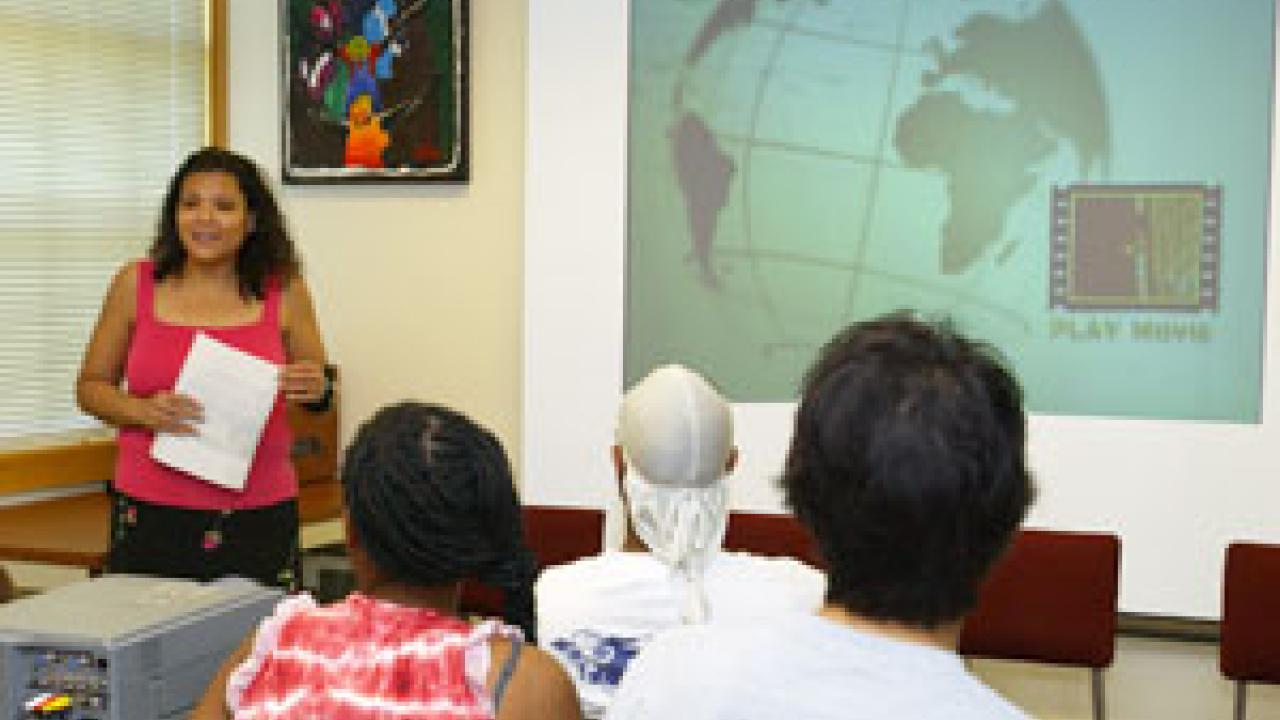For most people, watching movies is a way to relax for a couple hours.
For Christine Acham, it is a passion -- and one that has led to the creation of new and engaging coursework at UC Davis.
Acham, a professor of African American studies, moved to the United States from Trinidad after high school. After earning her degree from Clark University in Worcester, Mass., she went on to get a doctorate in film studies from the University of Southern California in 1999. The following fall she began teaching at UC Davis.
Acham teaches several classes. Among them, she leads Black Popular Culture, and African American Film and Video, which are mainstays in the African American studies department. She has also created two new courses over the last three years -- History of African American Television, and Black Documentary: Theory and Practice.
The documentary class is particularly unique. Acham teaches it every other year, enrolling about 12 juniors and seniors each time. Students are asked to make a documentary proposal and then work in groups to bring to life the four best themes using digital video. The class is hectic for both the students and Acham, who spends a lot of time editing and troubleshooting near the deadline.
"I pulled my first all-nighter since I was an undergrad," she says with a laugh. "It's a fun class to teach though. Watching them pull it all together is great."
The projects from last year's class ranged from how Africa is portrayed in America to issues of racism within Davis High School and the community at large. Acham said the documentaries were shown twice to the public and brought in large crowds each time.
Acham keeps herself busy out of the classroom as well. Her book Revolution Televised: Prime Time and the Struggle for Black Power is on its way to publication. Slated to come out in the fall of 2004, it focuses on TV during the black revolution of the 1960s and '70s when personalities like Richard Pryor were making their marks.
"I wanted to look at how black people at the time were able to empower themselves within mainstream television," she said.
Acham will be on leave for the next two quarters researching a new project on the Blaxploitation film era, but will return to teaching in the fall of 2004.
What are some of the biggest issues facing African Americans on campus?
Finding a community here is difficult because the number of African Americans is so small. Students feel isolated within the wider Davis community. They need support and a sense of place. Our student affairs coordinator, John Ortiz-Hutson, does a phenomenal job giving students a place to come.
What exciting things do you currently see happening in your department?
The department is growing, which is really nice to see. There's a demand for the classes so we've been able to bring in some new faculty over the past couple years. A lot of the professors here push their students to think critically as well, which is important.
How do you relax?
I frequently go to the movies for obvious reasons. I'm not a movie snob though; I go see anything. I saw "Bringing Down the House" with Queen Latifah, which was terrible. I hated "Monster's Ball" too, and "The Matrix: Reloaded" was pretty bad. It made no sense. I also tend to work out a lot and I like white water rafting. I'm kind of outdoorsy.
Who inspires you?
Richard Pryor inspires me because he came from such a difficult background. He used the form of comedy to critique what was happening in America. He was able to take a critical stand and still be very popular. Educator and writer Michael Eric Dyson also inspires me. His role as a public intellectual is critical. And, on a personal level, my mother. She has faced some hard times but she did an incredible job raising her children.
If a movie were made about your life, who would you want to portray you?
Angela Bassett. I think she's an amazing actress. I definitely see myself as far from one-dimensional, and she has the keen ability to tease out the complexity of any role she chooses.
What is your most treasured possession?
A gold bracelet that my mom gave me. It originally belonged to my great-grandmother. I wear it all the time. It's been passed down from generation to generation, so it has some history and some meaning.
What is your favorite spot on campus?
I love walking by the Memorial Union because I always see students I know. I like to be able to chat with students outside the classroom setting. Although my classroom setting is relatively casual, we still have a lot of important material to cover. Outside of class we can talk and joke around about numerous things like films, TV shows, African Americans in the news or events that they are organizing on campus.
If you were named president, what would be your first action?
I would revamp the education system. I'd pull money from the military and make sure every high school student would have the opportunity to go to any college they want.
